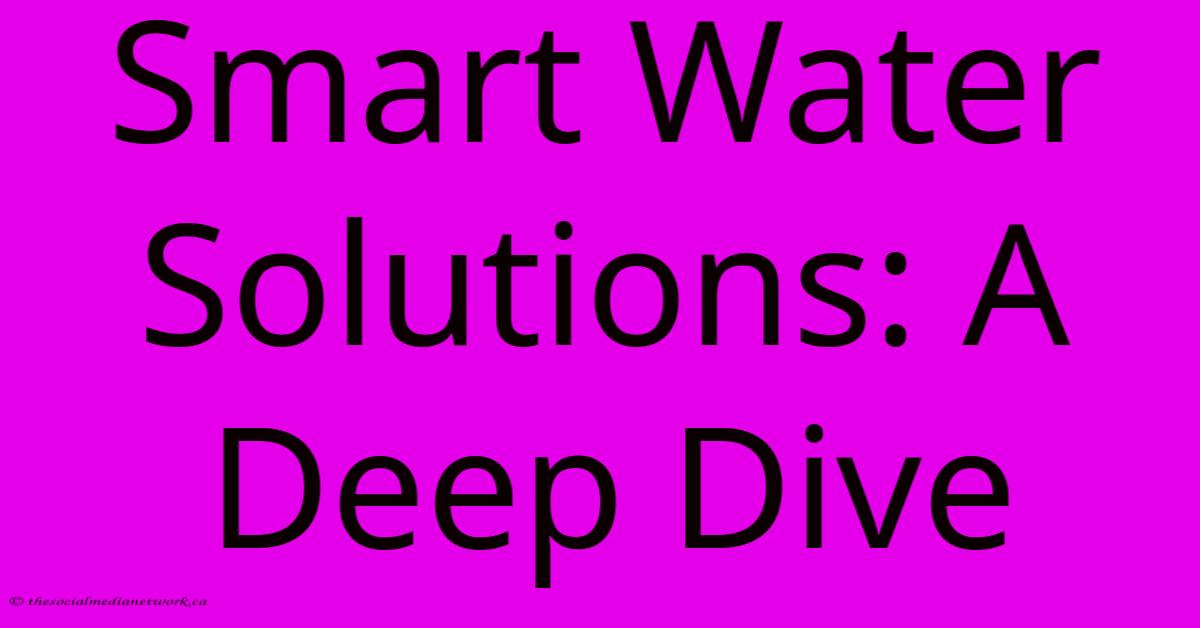Smart Water Solutions: A Deep Dive

Discover more detailed and exciting information on our website. Click the link below to start your adventure: Visit Best Website meltwatermedia.ca. Don't miss out!
Table of Contents
Smart Water Solutions: A Deep Dive
The global water crisis is intensifying, demanding innovative solutions to manage this precious resource effectively. Smart water solutions are emerging as a crucial response, leveraging technology to optimize water usage, conservation, and distribution. This deep dive explores the various aspects of smart water technology, its benefits, and the challenges in its widespread implementation.
Understanding Smart Water Solutions
Smart water solutions encompass a range of technologies and approaches aimed at improving water management across various sectors. These solutions leverage data-driven insights, automation, and advanced analytics to achieve better efficiency and conservation. Key components include:
1. Smart Meters and Sensors:
Smart water meters replace traditional meters, providing real-time data on water consumption. This data is transmitted wirelessly, allowing for remote monitoring and leak detection. Sensors placed throughout the water distribution network monitor pressure, flow, and water quality, providing valuable insights into the system's performance.
2. Advanced Analytics and Data Management:
The vast amounts of data generated by smart meters and sensors are analyzed using advanced analytics techniques. This helps identify patterns, predict problems, and optimize water usage. Effective data management systems are crucial for storing, processing, and visualizing this data.
3. Automation and Control Systems:
Automated control systems allow for remote operation and optimization of water infrastructure. This includes controlling water pressure, adjusting flow rates, and isolating leaks, leading to significant efficiency improvements.
4. Leak Detection and Repair:
Smart water solutions greatly enhance leak detection capabilities. By analyzing pressure fluctuations and flow data, leaks can be identified quickly, minimizing water loss and preventing damage to infrastructure. Rapid repair is crucial to minimize the impact of leaks.
5. Water Quality Monitoring:
Real-time monitoring of water quality parameters like pH, turbidity, and chlorine levels helps ensure safe and reliable water supply. This is especially important for detecting contamination and ensuring compliance with regulations.
Benefits of Smart Water Solutions
The implementation of smart water solutions offers numerous advantages:
- Reduced Water Loss: Early leak detection and repair significantly minimizes water loss due to leaks and bursts.
- Improved Water Efficiency: Optimized water distribution and pressure management leads to increased efficiency in water usage.
- Enhanced Water Quality: Continuous monitoring ensures safe and reliable water supply, meeting regulatory standards.
- Cost Savings: Reduced water loss, improved efficiency, and proactive maintenance translate to significant cost savings for water utilities.
- Better Resource Management: Data-driven insights allow for better planning and management of water resources.
- Improved Customer Service: Real-time data allows for quicker response to customer issues and improved communication.
Challenges in Implementing Smart Water Solutions
Despite the numerous benefits, there are challenges in the widespread adoption of smart water solutions:
- High Initial Investment: The cost of installing smart meters, sensors, and software can be significant.
- Data Security and Privacy: Protecting the sensitive data collected by smart water systems is crucial.
- Integration with Existing Infrastructure: Integrating new technology with legacy infrastructure can be complex and costly.
- Technical Expertise: Managing and interpreting the data generated by smart water systems requires specialized technical expertise.
- Public Acceptance: Gaining public acceptance and addressing concerns about data privacy is essential for successful implementation.
The Future of Smart Water Solutions
Smart water technology is constantly evolving, with ongoing research and development focusing on:
- Artificial Intelligence (AI) and Machine Learning (ML): AI and ML are being integrated into smart water systems to enhance predictive capabilities and optimize decision-making.
- Internet of Things (IoT) Integration: The seamless integration of IoT devices allows for more comprehensive and real-time monitoring of water systems.
- Blockchain Technology: Blockchain can enhance data security and transparency in water management.
In conclusion, smart water solutions are crucial for addressing the global water crisis. While challenges remain, the benefits of improved efficiency, conservation, and resource management make the investment in these technologies essential for a sustainable water future. By overcoming the implementation hurdles and embracing ongoing technological advancements, we can ensure a more secure and efficient water supply for generations to come.

Thank you for visiting our website wich cover about Smart Water Solutions: A Deep Dive. We hope the information provided has been useful to you. Feel free to contact us if you have any questions or need further assistance. See you next time and dont miss to bookmark.
Featured Posts
-
Jdts Winning Streak The Challenge Of Chinese Opposition
Nov 26, 2024
-
Strategic Review Oil And Gas Automation
Nov 26, 2024
-
Truck Heist 2 4 Million In Tech Goods Stolen
Nov 26, 2024
-
Afc Champions League Result Al Rayyan Defeats Persepolis
Nov 26, 2024
-
Shandong Taishan Wins Tight Match Vs Jdt
Nov 26, 2024
